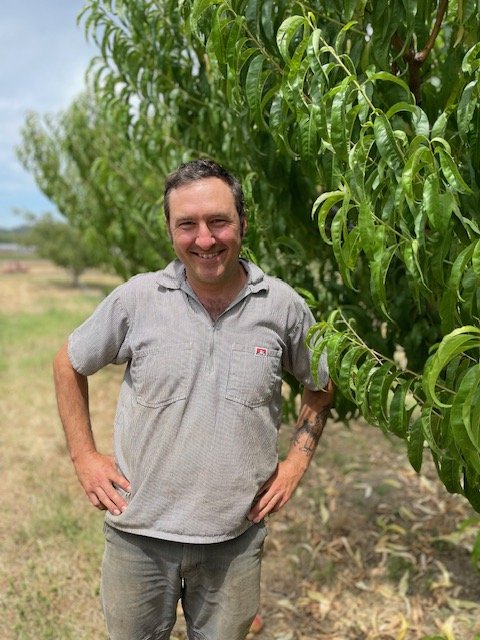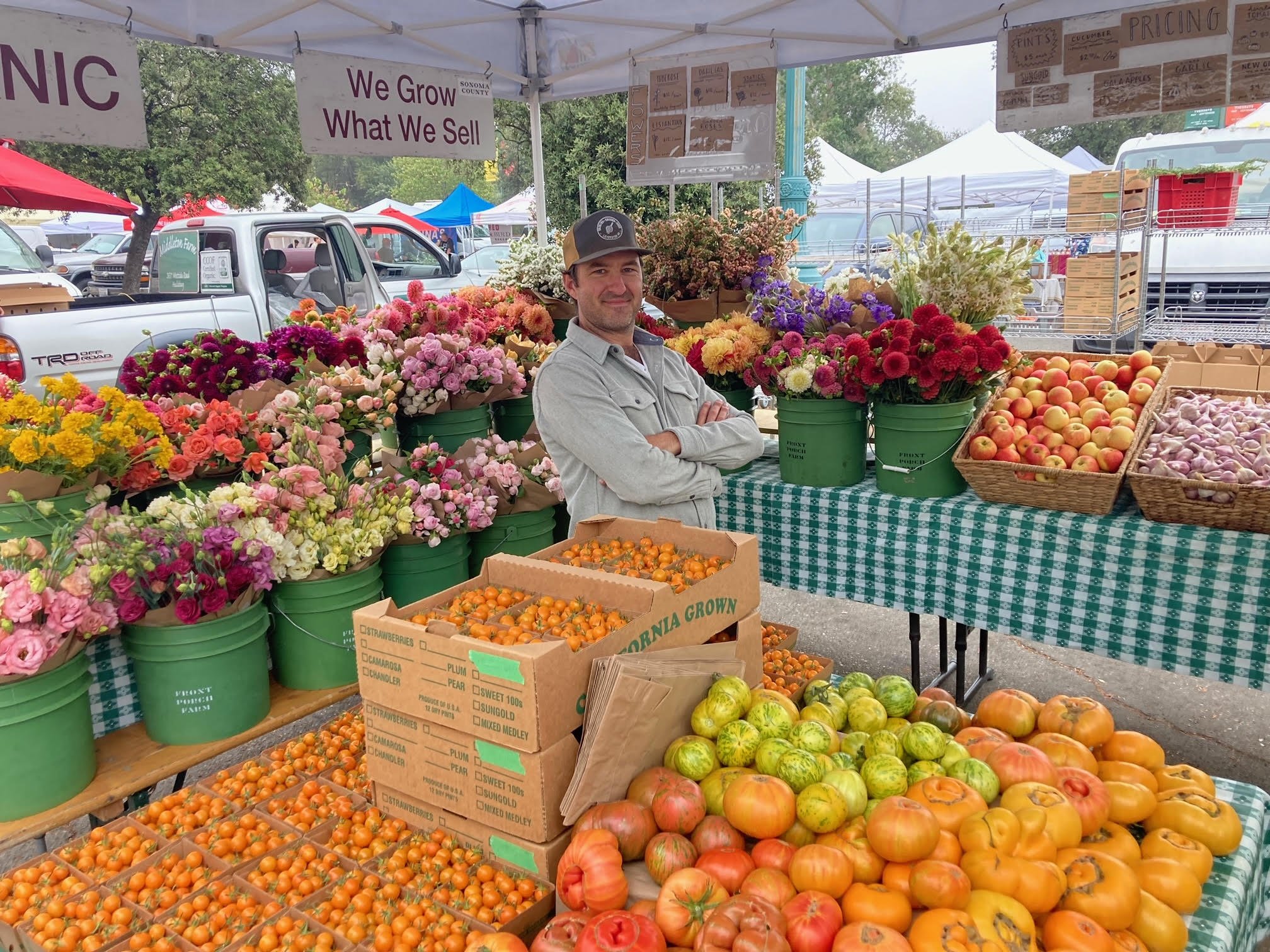Front Porch Farm, Healdsburg
Written by Lauren Papalia
Lauren is part of FEED’s marketing team, a writer and part-time farmer
My son and I spent some time on a warm and bright afternoon at Front Porch Farm, a 110-acre holding on the alluvial plain abutting the Russian River at "Digger's Bend", near Healdsburg. The folks at Front Porch are members of FEED Cooperative and have been working with us since 2012, regularly contributing to our delicious FEED bins. Of the 110 acres, about 50 are currently in production growing over 200 varieties of certified organic mixed annual and perennial cut flowers, blackberries, stone fruit, and veggies, including Rhone wine grapes and Flint corn the farm grows and then mills into polenta (unfortunately all sold out by the time I got there).
The farm's general manager, Tommy Otey, met us cheerfully in the parking area and showed us around. We talked all things soil health, biodiversity, cover crops, land stewardship and what it means to farm in one of the most agriculturally rich areas of the country. Tommy also treated us to the best peach we'd ever had, right off the tree. The following is a condensed version of our sticky-faced conversation.
Front Porch Farm manager Tommy Otey, next to a Silver Logan peach tree.
LP: Can you give me a little background about the farm and the commencement of your role/position as manager?
TO: I have been farming since my first day of school on the College Farm at Warren Wilson College in 2004 and have worked in a diversity of enterprises across the country since then. I started with Front Porch Farm in 2013 managing Acorn Ranch (sister operation) in Mendocino County raising Heritage Pigs and grazing Sheep. We sold retail cuts direct to consumer and whole carcass animals to restaurants in the Bay Area. I moved to our Sonoma County location in 2017 and now live on the farm with my wife Zoe, who runs our flower operation, and our 2-year old son, Kelly.
Front Porch Farm manager, Tommy Otey, with his family.
LP: Water insecurity has spurred curtailment by the state and the seesaw of drought and flood has wreaked havoc on many farms' operations. Tell me about the reservoir installation at Front porch Farm and how your team is challenged by these extremes.
TO: The rains this past winter pulled us out of an irrigation water curtailment cycle that we have been in with the State Water Resource Control Board since June of 2021. After facing complete curtailment in 2021, we were given water allotments through the 2022 growing season on a month-by-month basis, making crop planning practically impossible and causing us to scale down our operation by about 75%. We have since built a water storage reservoir that will give us water security going forward, and allows us to store winter flows for use in the summer. To put the Climate whiplash in perspective, the farm was underwater during the floods in February of 2019, and we were shut down due to drought by July of 2021.
LP: Front Porch lists caring for the "biotic community resident in [the] soils" as a main tenet of the farm's ideology. What does this look like in practice, and what is the connection between this practice and the final edible product?
TO: Our most abundant labor force exists in the soil in the form of soil biology. Across the operation, we strive to keep our soils covered as much of the year as possible, to promote biodiversity in our crop rotations and cover crops, and to reduce tillage passes whenever possible. That all being said, anyone who farms knows that this is all easier said than done in a rapidly changing climate, with rising costs, and thin margins... so I guess I would say that when making management decisions on the farm, our goal is to always ask "how will this practice benefit or harm soil biology?" and use that framework to make the best decision possible at that time. We believe that this framework not only benefits our friends in the soil, but also produces more nutritious food, with more flavor, and a better shelf life.
LP: You mentioned that the farm is seeking to increase perennial production. What does this entail, and why are you looking to go in this direction?
TO: We are investing in perennial crops for many reasons. First, they help us achieve our goal of reducing soil disturbance wherever possible. They also help us balance our labor budget throughout the year, ensuring sufficient winter hours for our year-round employees, since most of the management of these perennials takes place in the dormant season. Many of these perennial crops are also higher value items, for example: Blackberries, Peonies, Garden Roses, Wine Grapes, etc.
The Front Porch farm crew harvests blackberries.
LP: The FSA (Sonoma County Food System Alliance) envisions a system in which local growers are economically viable and consumers have access to healthy, affordable food. Do you think such a symbiosis can actually happen?
TO: I think that is a noble mission statement, but getting there will take some significant change. The word "affordable" stands out to me, because of course that is a relative term. There are so many challenges standing in the way of this goal, particularly in Sonoma County where the housing crisis, wealth gaps, and systemic inequity are all working against us. Healthy food can only be grown by healthy farmers making a living wage. I feel like that is about all we have control over in this situation, so we are working to find ways to diversify our business to improve wage growth potential.
LP: It is FEED's mission to help create a more equitable and resilient food system. How important is the role of the consumer in this system and in growing a culture of investment?
TO: Consumers will have to play a huge role in the restoration of our food system and every link in the supply chain has a responsibility to educate and influence the consumers to create positive demand for healthy, locally grown foods. For the consumers, that positive demand must be accompanied by a better understanding of the costs of production that shepherds a culture of investment in farms, their community, and their health. As for the supply chain, we have to end this race to the bottom (in regards to pricing) and grow farmer's margins.
LP: What is your vision for the farm's future? What are you most excited or hopeful about?
TO: My hope for the future of the farm, first and foremost, is to find a reliable way to create sustained wage growth for our employees. Without that, we cannot achieve sustainability on any level. Also high on the list is to build climate resiliency into our cropping systems and infrastructure, to lessen our dependence on petroleum based products, and to find more ways to involve our community, particularly youth, to help tie people back to the land where their food is grown.








